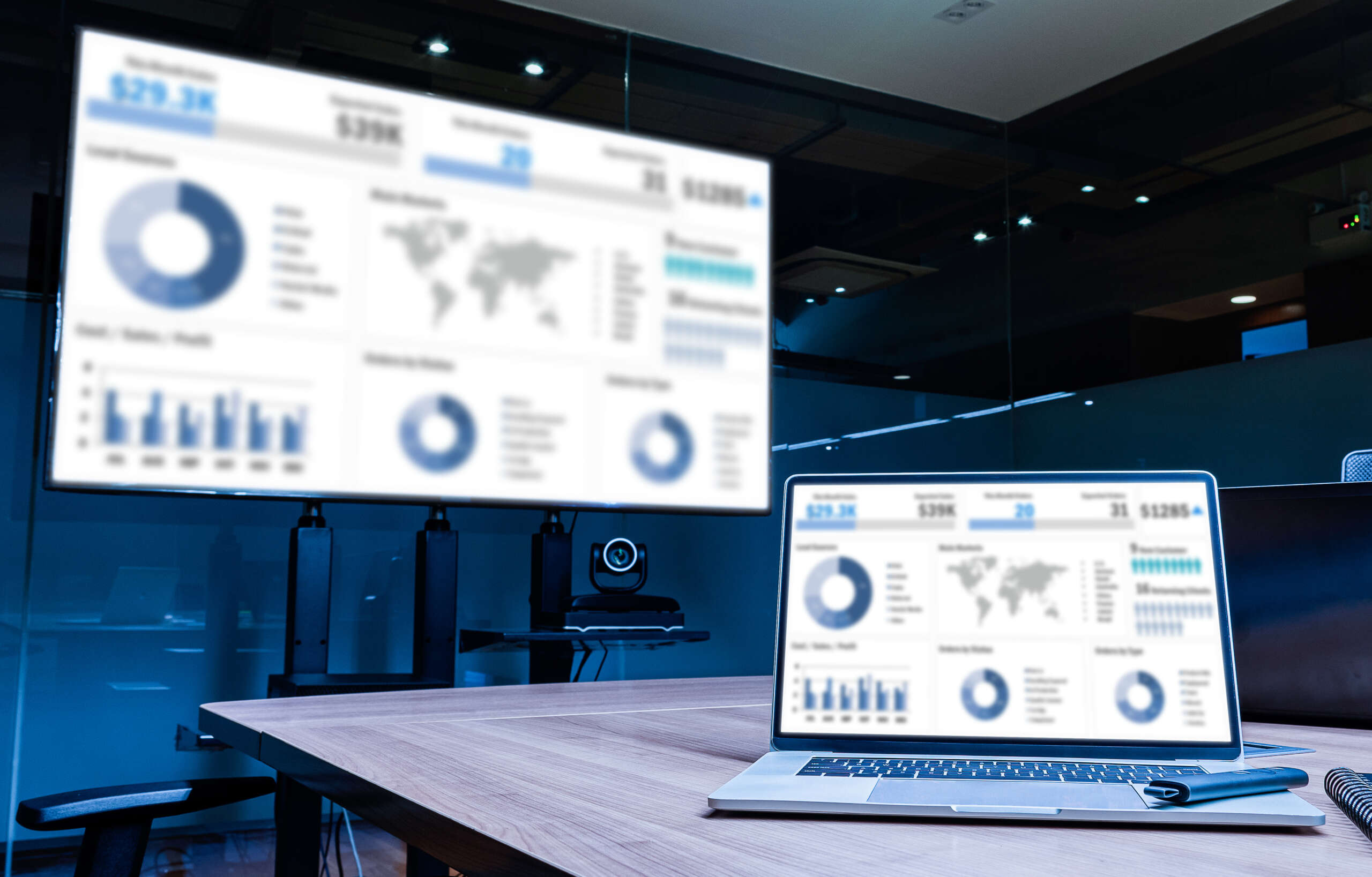In the business world, getting sales forecasts right is key to growing and staying strong. But, 80% of companies have missed their revenue targets in the past two years. This raises the big question: how can businesses move from guessing to using predictive analytics for sales?
The answer is using AI in Sales Forecasting. Investing in AI tools is not just a trend; it’s a must to stay ahead in a changing market. AI can learn from past data and give an honest look at sales pipelines, helping to boost sales.
Think about this: companies using data to guide their sales see profits jump by up to 20%, says McKinsey. Those with accurate forecasts have a 10% better chance of growing their revenue each year. So, AI in Sales Forecasting is turning guesswork into a precise science.
At the intersection of tech and strategy, AI cuts down on manual data work and makes sales management more efficient. This is seen in how Salesforce’s Einstein has changed the game. With AI, companies can use resources wisely, manage their teams better, and quickly adapt to market shifts.
B2B companies now have weekly forecasting meetings, and big names like Amazon say 35% of purchases come from AI-powered suggestions. It’s clear: the future of sales is with AI’s smart algorithms. Can businesses really ignore the big benefits AI offers?
The Impact of Accurate Sales Forecasting on Business Growth
Accurate sales forecasting is key to growing a business. In B2B sales, knowing what customers will buy helps a company make more money and be more profitable. Thanks to improving sales forecasts with AI, this process has gotten much better.
Now, methods like Time Series Forecasting and Regression Analysis help make sales predictions more accurate. These tools look at many things, such as who buys things, prices, sales deals, and even the weather.
Using AI to predict sales helps businesses manage their stock better. They don’t overbuy or run out of items, which helps with cash flow. This also means they can plan better for the future, making things run smoother.
Adding AI-enhanced sales projections to tools like CRM systems helps get data right. This lets companies know what customers want, plan better, and keep enough stock. This means less waiting for customers and happier customers.
Research shows that regular forecasting, done by 74% of big B2B companies every week, brings a big return on investment. This is more than companies that don’t forecast often.
But AI isn’t just for keeping stock or meeting customer needs. It helps shape smarter business plans. Better forecasting means better decisions on prices, marketing, and growing the business. This leads to a stronger financial outcome.
In the end, using AI for sales forecasting helps with daily operations and long-term growth. As markets change and what customers want changes, AI tools are key. They help businesses stay ahead with accurate sales forecasts.
The Transformative Benefits of Using AI in Sales Forecasting
Using AI for sales forecasting changes the game from old ways. It uses advanced tech to predict sales with great accuracy. Companies get to quickly analyze huge amounts of data, finding key insights for smart decisions. AI is great at spotting patterns and predicting trends, helping to improve sales plans and how resources are used.

Studies show AI forecasting software can be up to 96% accurate. This proves its power in understanding market needs and customer behavior. AI can look through years of sales data in minutes, a job that took weeks before. This saves time and cuts down on errors, making sales strategies more reliable.
AI does more than just crunch numbers. It looks at customer reviews and social media to understand what customers feel. This helps businesses change their plans quickly. It makes customers happier and more likely to stay, which is key for growth.
AI is also great at automating tasks like data entry and following up on leads. This lets sales teams focus more on strategy and less on paperwork. Tools like chatbots help bring in and qualify leads, keeping the sales funnel full of good prospects.
Overall, AI in sales forecasting keeps businesses ahead in a fast market. It gives detailed and accurate forecasts, helping make smart, data-based decisions. This leads to reaching goals more efficiently and effectively.
AI in sales forecasting is not just a tool but a transformative force that remodels every aspect of how businesses approach sales and customer engagement.
AI-Driven Sales Predictions and Market Responsiveness
AI-driven sales predictions are changing how businesses react to fast-changing markets. By using predictive analytics for sales, companies can make better use of data. This helps them adjust their plans quickly. In today’s fast-paced market, being quick and smart is what puts leaders ahead.

AI has made sales forecasting much more accurate. Old methods often had big errors because of human mistakes and poor data handling. But AI can learn from data over time, making forecasts more accurate. This means less risk and better response to sudden changes, like during the COVID-19 pandemic.
Using AI-driven sales predictions gives businesses an edge. These tools look at lots of data to spot trends and issues early. This way, companies can manage stock better, use resources wisely, and make their teams happier by cutting down on guesswork in forecasting.
Retail and online stores gain a lot from accurate demand forecasting. Avoiding too much or too little stock saves money and meets customer needs better. AI also helps improve customer service by guessing what customers want and how they behave. This makes sales more personal and boosts customer happiness.
Adding AI makes sales smoother and helps businesses be more flexible. As markets keep changing, predictive analytics for sales will be key in making strategies that are quick and smart.
Strategic Advantages of AI-Enhanced Sales Projections
Using AI-enhanced sales projections gives businesses a big lead. It lets them use AI to make their sales better. AI helps spot and grab opportunities quickly, which is faster than the old ways.

AI-driven sales predictions use big data to make sense of lots of info. This turns data into useful tips. It speeds up making decisions and makes sales forecasts more accurate.
AI keeps getting better with new data, making its predictions more right over time. This cuts down the risks of guessing wrong in the market.
Sales folks say AI helps them manage their time better. Most say AI lets them focus on fun and important parts of their job. For example, 78% of sales professionals say AI helps them with more strategic tasks. And 73% say AI finds important info in complex data that’s hard to see otherwise.
AI’s real-time data processing and analysis make businesses run smoother. For instance, 69% of sales professionals say AI makes customers feel more special. This is key in today’s market where customers are everything.
By using AI tools, companies get better at forecasting and can plan better. This leads to growing their business and making more money.
In short, AI-enhanced sales projections give companies a deep look into the market and what customers want. This lets them stay ahead and be quick to adapt. It helps build a business that’s smart, flexible, and always planning for the future.
Predictive Analytics for Sales and the Role of AI in Resource Management
Predictive analytics for sales, powered by AI, are changing how businesses manage resources. They give a deeper look into market trends and buyer habits. This helps businesses use their resources better.
These tools have boosted sales by 25% and made forecasting 50% more accurate. AI also helps manage inventory better and adjust prices based on market demand. This makes sure resources are used effectively.
Companies using AI for lead scoring have seen a 50% increase in qualified leads and a 40% drop in customer costs. AI is making lead generation and qualification more efficient. This is key for planning sales strategies and delegating tasks well.
Indeed, the integration of AI into sales processes transforms not just numbers but the very mechanisms through which these numbers are achieved, fostering sustained business growth and operational efficiency.
AI gives insights that show which deals have the best potential and where to focus. For example, AI chatbots have cut down customer questions by over 80%. This makes customers happier and more loyal, which helps sales indirectly.
Security is also a big deal, as 60% of businesses have faced data breaches. Using strong AI tools helps protect data and manage large amounts of customer and sales information.
The future of predictive analytics in sales is linked to AI’s ability to understand and learn from data. This improves sales and personalizes marketing. Such strategies lead to a 15% increase in sales and 20% more customer satisfaction.
Predictive analytics for sales is changing the game from planning to making quick decisions. As businesses deal with market trends and consumer likes, using AI in sales strategies is crucial. It helps grow and expand businesses.
AI in Sales Forecasting: Reshaping the Sales Landscape
AI is changing how businesses plan their sales, becoming key for making accurate sales strategies. It helps reduce the need for old manual methods, which were often wrong. Using AI for sales predictions makes forecasts up to 96% accurate and boosts efficiency.
Using AI in sales forecasting means setting clear goals and preparing data well. Choosing the right tools, training models, and checking them regularly is important. This makes sure forecasts are not just right but also useful. AI uses machine learning and data science to look at lots of data and predict sales trends well.
AI also helps make smarter choices. It lets businesses manage stock better, staff correctly, and talk to customers in a more personal way. These changes make customers happier and more loyal. This shows how AI is changing sales, making it a key part of sales strategies.
The move to AI in sales forecasting is a big change in how sales are handled. It brings more accuracy and a stronger base for making decisions. This helps businesses stay ahead in fast-changing markets.
Conclusion: The Future of Sales Lies in AI Technology
Throughout this article, we’ve seen how AI is changing sales forecasting. It’s not just a new tool but a big change in how businesses plan their sales. By using AI for accurate sales forecasting, companies can quickly analyze big data and update their forecasts. This is key in our fast-changing market.
But, using AI isn’t easy. Companies need a lot of data and must watch out for biases in that data. Also, adding AI to current systems and training staff can be tough. Yet, tools like Behavior AI and platforms like Ebsta and Clari show great promise. They offer sales predictions, adaptable learning, and deep insights into sales interactions, changing how we approach sales.
AI is becoming a big part of sales forecasting, but human skills are still crucial. Sales experts are now using AI to enhance their work and make better decisions. For those good at using AI, the benefits are big, like career growth and leading successful teams. The mix of AI and sales know-how will keep driving the industry forward, making smart decisions the norm. This will lead to a future where sales are smart, adaptable, and excellent.



